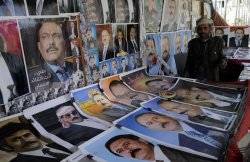The UN Security Council has told Yemen's former president and vice president that they could face possible sanctions along with others reported to be interfering in the country's democratic transition and undermining the national unity government.
Lyall Grant said that during a Security Council mission to Yemen three weeks ago members heard concerns about Saleh and other "spoilers" undermining a national dialogue conference, which Hadi has scheduled to start on March 18.
"What he should not do is undermine the political transition, the national dialogue, which is fully supported by all the international community," Lyall Grant said.
"What we are saying is that we are giving our full weight behind that process, and we will not tolerate individuals of whatever stature undermining that process."
The council statement also expressed concern about reports "of money and weapons being brought into Yemen from outside for the purpose of undermining the transition".
Last week, Yemen asked the council to investigate a ship that Yemeni authorities said they seized with a cargo of Iranian-made bomb-making material, suicide belts, explosives, Katyusha rockets, surface-to-air missiles, rocket- repelled grenades and large amounts of ammunition.
Hadi had previously sent a message to his Iranian counterpart, Mahmoud Ahmadinejad, calling on him to stop sending arms to Yemen and quit supporting a southern separatist movement.
Weapons seizure
Lyall Grant said the Security Council has asked the committee monitoring sanctions against Iran to investigate the weapons seizure.
The council statement reiterated the need for the transition to be "underpinned by a commitment to democracy, good governance, rule of law, national reconciliation and respect for the human rights and fundamental freedoms of all people in Yemen".
It urged the government to pass legislation on transitional justice to support reconciliation without delay.
The council emphasized the need for all segments of Yemeni society to be included in the national dialogue conference.
It called on all parties to honor the benchmarks and timetable in the transition agreement which call for the national dialogue to lead to a constitutional referendum and elections by February 2014.
PHOTO CAPTION
A Yemeni vendor displays pictures of former Yemeni president Ali Abdullah Saleh for sale in Sana'a, Yemen, 16 February 2013.
Aljazeera


 Home
Home Discover Islam
Discover Islam Quran Recitations
Quran Recitations Lectures
Lectures
 Fatwa
Fatwa Articles
Articles Fiqh
Fiqh E-Books
E-Books Boys & Girls
Boys & Girls  Hajj Rulings
Hajj Rulings Hajj Fatwas
Hajj Fatwas














